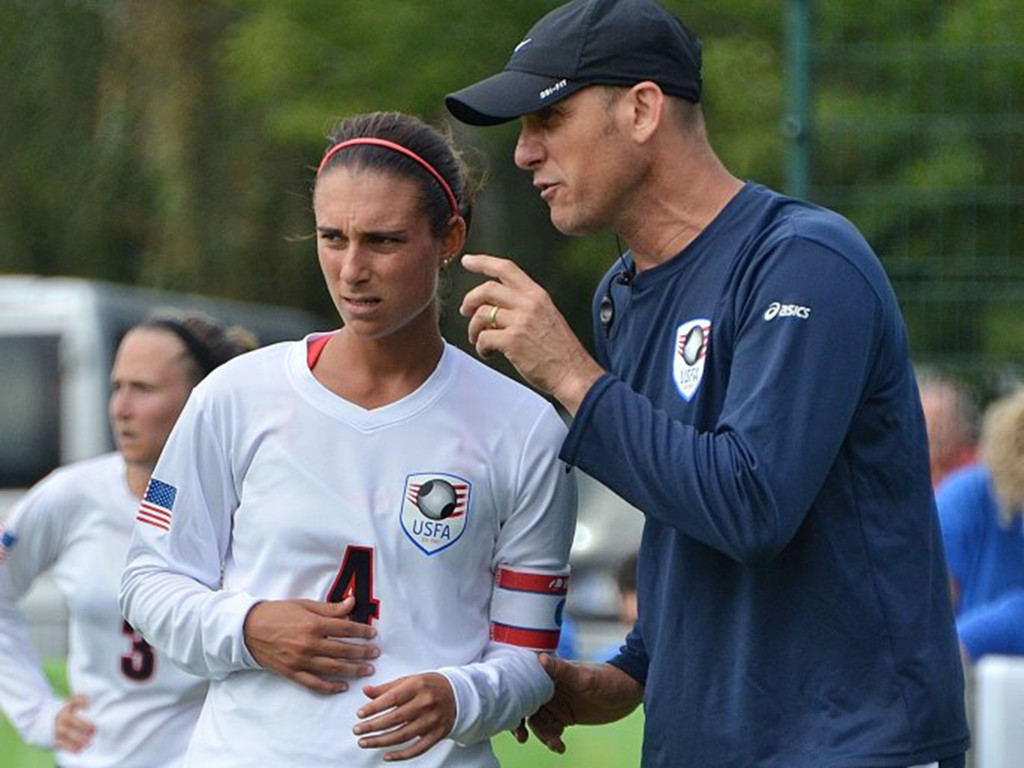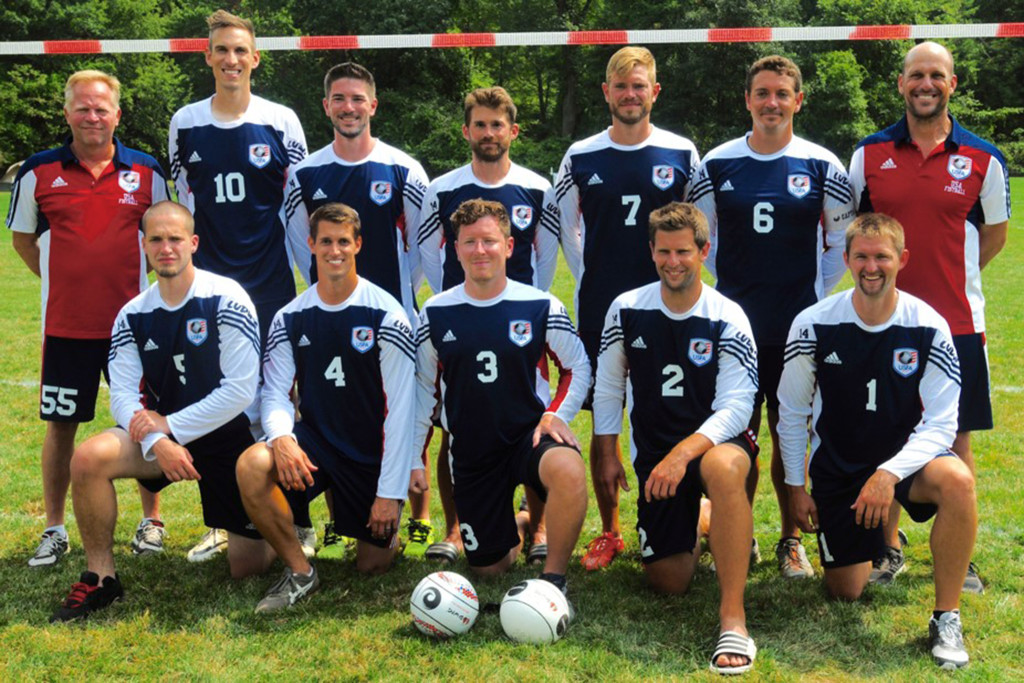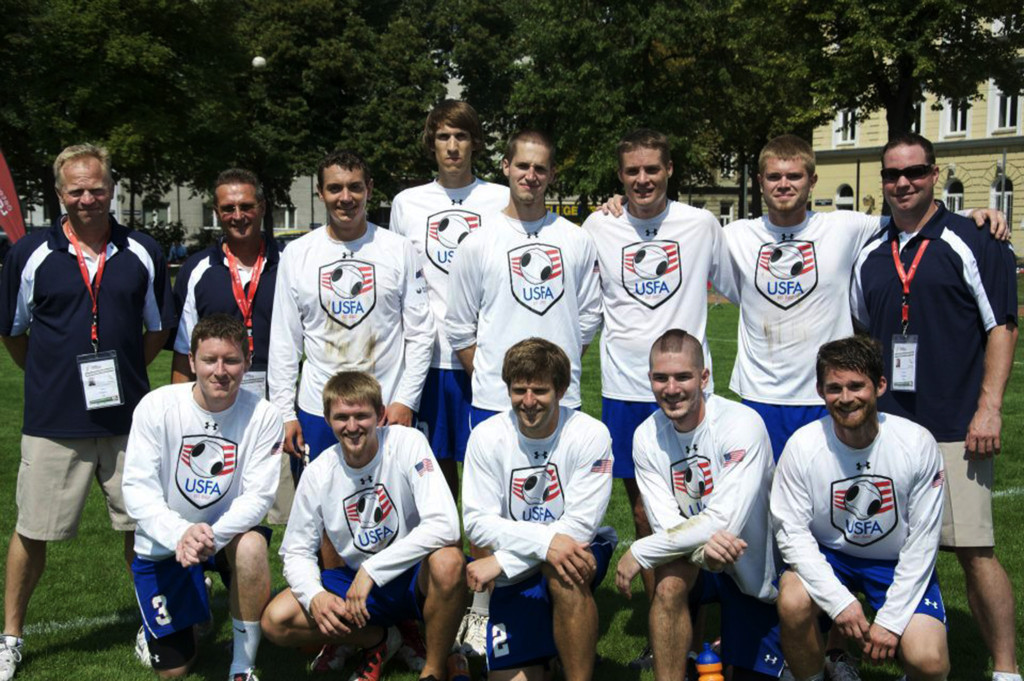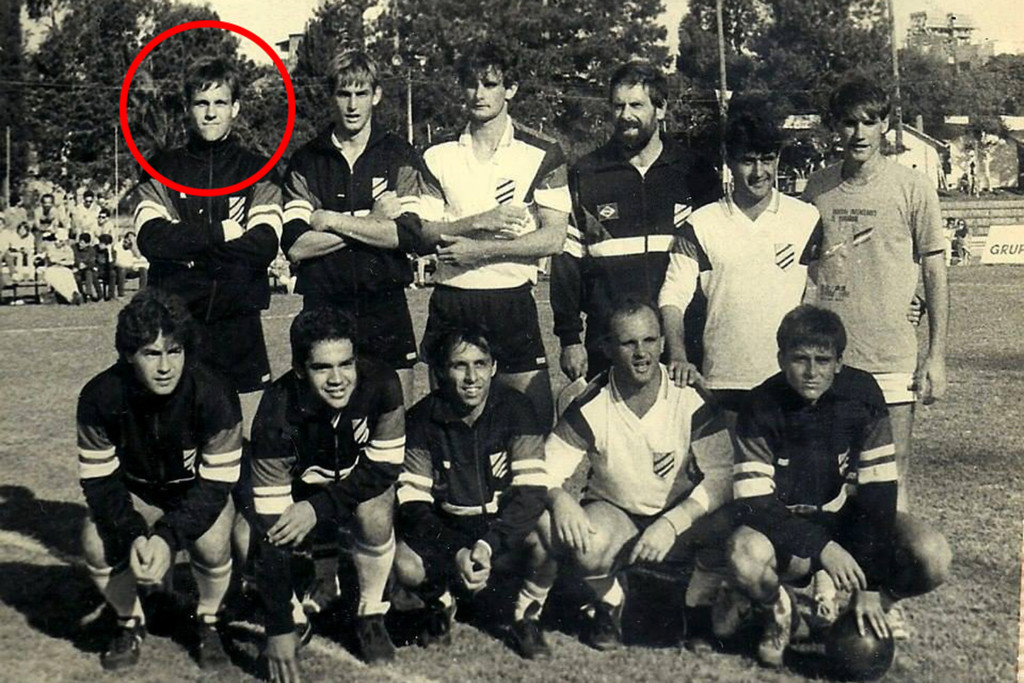ENGLISH VERSION BELOW
Picture Copyright Manfred Lindorfer

„Ich spreche nicht von konkreten Zielen, ich spreche von Träumen.“
Der brasilianische “Botschafter des Faustballsports“, wie Gastão Englert (49) auf der Homepage des US-Verbands genannt wird, ist einer der erfolgreichsten Trainer in der Faustballgeschichte. Er konnte als Trainer mit der brasilianischen Nationalmannschaft drei WM-Titel gewinnen – 2x mit den Herren (1999, 2003) und 1x mit den Damen (2010). Seit 2011 zeichnet er sich für den Aufschwung im amerikanischen Faustball mitverantwortlich. Er erzählt uns warum er nach 14 Jahren in Brasilien zum US-Verband gewechselt hat und warum es wichtig ist die besten Teams der Welt in die “Staaten” zu holen.
IFA: Hallo Gastão, auf den ersten Blick erscheint es schon etwas ungewöhnlich, dass ein Brasilianer die Faustballnationalmannschaft der USA trainiert. Wie ist es denn dazu gekommen?
Gastão Englert: Naja, bei der Weltmeisterschaft 2007 hatte ich zum ersten Mal Kontakt mit den Amerikanern. Sie haben mich beim Training beobachtet und dann gesagt: „Uns gefällt deine Art das Training zu leiten. Wie viel würde es kosten, dass du einmal in die USA kommst und uns Faustballtipps zu geben?“. Ich habe dann entgegnet: „Bitte was? (lacht) Das kostet gar nichts, ihr bezahlt mir das Flugticket und dann komme ich während meinem Urlaub zu euch.“ Sie waren sehr überrascht über meine Antwort. Im Januar 2011 war es dann soweit und ich blieb für zwei Wochen dort, wir haben viel trainiert und Ziele vereinbart. In diesen zwei Wochen habe ich förmlich gespürt, wie die Motivation bei jedem einzelnen Spieler immer größer wurde.
IFA: Die Motivation war also vorhanden, sie benötigten nur einen Profi um ihnen zu zeigen wie man sich faustballtechnisch gezielt verbessern kann?
Gastão: Ja genau, jeder war mit Leidenschaft dabei um die aufgestellten Ziele zu erreichen. Ein halbes Jahr später bin ich dann gleich für ein ganzes Monat in die USA geflogen um die weitere Trainingseinheiten abzuhalten. Bei den Weltmeisterschaften im Sommer 2011 hat man dann gesehen, dass die gesamte Mannschaft um Längen besser war als im Jahr 2007.
IFA: Aber bei der Weltmeisterschaft warst du noch für Brasilien als Cheftrainer tätig?
Gastão: Genau, das war mein letzter internationaler Auftritt für Brasilien. Ich habe als Nationaltrainer der Damen und Herren für ganze 14 Jahre gearbeitet und alles gewonnen, was es zu gewinnen gibt – Weltmeisterschaften, World Games und Südamerika Meisterschaften – ich hatte genug von Faustball zu diesem Zeitpunkt, daher bin ich vom Nationalteam zurückgetreten. Meine Motivation für die Arbeit im Faustballsport war sehr sehr gering damals. Ich habe mir oft gedacht: „Ich muss jetzt etwas finden das mir einen Grund gibt weiterzumachen.“ Es mag verrückt klingen, aber um einen WM-Titel zu kämpfen war für mich keine Challenge mehr, es hat mir nichts mehr gegeben.
IFA: Dann war die Tür also offen für den US-Verband?
Gastão: Ein halbes Jahr nach der WM in Österreich habe ich wieder einen Anruf aus den USA erhalten und ich wurde eingeladen weitere Trainings vor Ort zu leiten. Dann ist es mir in den Kopf geschossen: „Diese Aufgabe ist vielleicht genau das was ich gesucht habe.“. Der Weg zu einer Zusammenarbeit bis zur Weltmeisterschaft 2015 war geebnet. In den vergangenen drei Jahren war ich nun zwei Mal pro Jahr für zwei Wochen in Amerika. Ich habe intensive Trainingseinheiten gemacht, neue Ziele und Strategien entwickelt, sowie die Trainer instruiert wie sie zu arbeiten haben, wenn ich nicht da bin. Das funktioniert hervorragend und immer wenn ich wieder komme sehe ich einen großen sportlichen Fortschritt, das finde ich großartig.
IFA: Das Langzeitziel deines Engagements war bzw. ist die WM 2015, wirst du danach auch als Trainer des US-Teams zurücktreten?
Gastão: Das ist eine gute Frage. (lacht) Wir sprechen bereits über den nächsten Schritt und ich fühle mich von den Burschen in meiner Arbeit bestätigt. Ich kann mich wirklich mit allem, was hier im Verband passiert, identifizieren. Immer wenn ich in die USA komme ist jeder glücklich und freundlich, es fühlt sich für mich schon wie Heimat an. Die ganze Gruppe war der Grund, dass ich meine Arbeit im Faustball fortgesetzt habe und meine aktuelle Motivation dort weiterzuarbeiten ist sehr hoch. Nun spielt mein Team nicht mehr um den Titel, aber das ist auch nicht der Anspruch für mich, es sind andere Dinge, die für mich wichtig sind. Unser Ziel ist es nicht, die besten Mannschaften der Welt zu schlagen, wir müssen uns auf uns selbst konzentrieren und sicherstellen, dass wir unsere bestmögliche Arbeit leisten – an jedem einzelnen Tag.
IFA: In Österreich 2011 belegten die USA Rang 9, was ist das Ziel für die Weltmeisterschaft 2015 in Argentinien?
Gastão: Was ich mit Sicherheit sagen kann ist, dass wir dieses Mal viel besser sein werden als noch vor vier Jahren. Wir wissen aber auch, dass die anderen Nationen ebenfalls fleißig trainiert haben, unser Job ist es den perfekten Punkt in jeder Situation zu spielen. Das bedeutet immer 100 Prozent zu geben und jede Spielsituation bestmöglich zu bewältigen. Einen großen Nachteil haben wir: es fehlen uns hier die hochklassigen Gegner im Umkreis, wir spielen immer nur gegen dieselben Leute. Ich habe mich daher ins Zeug gelegt um Top-Spieler und Teams nach Amerika zu bringen. Das Resultat dieser Anstrengung waren dann die ersten Pan American Fistball Spieler in New Jersey, dieses Jahr im August. Ich wollte einfach mit dem „Gesellschafts-Faustball“ brechen, bei dem sich Leute einfach nur treffen um Spaß zu haben und dann gemeinsam Bier trinken. Es gibt auch eine andere Seite, wenn man international aktiv wird, bekommt man eine Vorstellung davon, was man alles erreichen kann. Wir spielen nun auf internationalem Level und möchten auch regelmäßig Turniere ausrichten, wir sind auf einem guten Weg.
IFA: Kommen wir noch einmal zurück zu den PanAmerican Games (27. – 31.August). Wie hast du das erste internationale Faustballevent auf amerikanischem Boden erlebt? Wie waren deine Eindrücke?
Gastão: Wir wollten einfach mal die internationale Faustballelite ins Land holen und Menschen in der Umgebung dazu motivieren sich mehr mit dem Sport auseinanderzusetzten – dieses Ziel haben wir zu 100 Prozent erreicht. Mit solchen Events lockst du auch hochrangige Vertreter aus der Politik und Sponsoren auf den Sportplatz, das ist sehr wichtig. Der Bürgermeister von Flanders war von der Veranstaltung so angetan, dass er gleich an zwei Tagen die Faustballaction mitverfolgte. Das hohe Niveau, die Gespräche und Trainings mit den Sportlern aus den verschiedensten Ländern, das alles waren kleine Bausteine, die das Turnier so erfolgreich gemacht haben.
IFA: Der amerikanische Verband hat große Ziele, für die WM 2019 hat man sich als Ausrichter beworben. Mit der Schweiz hat man einen WM-erfahrenen Konkurrenten, was ist deine Meinung zur Vergabe der nächsten WM?
Gastão: Es ist eine tolle Herausforderung für uns. Es hat alles mit scherzhaften Gesprächen mit meinen Spielern begonnen. Ich habe gesagt: „Hey Leute, wie wäre es wenn wir eine WM in Disneyworld zu organisieren. Alle würden ihre Familie mitbringen und wir bringen die größte Zuschauerkulisse, die der Faustballsport jemals gesehen hat in die USA.“ Aber jetzt im Ernst, die Herren Faustball Weltmeisterschaft ist ein ganz anderes Kaliber als die Pan American Games, dieses Event kann nicht mit ein paar Vereinsmitgliedern durchgeführt werden. Wenn wir die WM ausrichten, dann soll es die beste Weltmeisterschaft werden die es bis zu diesem Zeitpunkt gegeben hat. Man muss Träume haben und ich denke es ist möglich.
IFA: Du hast bereits gesagt, dass du von deinen Spielern den perfekten Punkt in jeder Situation forderst. Was ist deiner Meinung nach das bestmögliche Ergebnis, das das US-amerikanische Team erreichen kann?
Gastão: Es ist nicht einfach diese Frage mit einer konkreten Platzierung zu beantworten. Ich sage meinen Spielern immer: „Das Ergebnis ist nicht das Produkt, sondern das Ergebnis ist die Konsequenz aus eurem Training.“ Alle anderen Teams haben auch hart trainiert, also spreche ich nicht von konkreten Zielen sondern nur von unseren Träumen. Wir wollen 2017 bei den World Games in Polen teilnehmen, dafür müssen wir mindestens Sechster werden, das ist unser Traum. Es wird sehr schwer werden diese Platzierung zu erreichen, aber man wird doch wohl noch träumen dürfen. (lacht)
IFA: Danke für das Interview Gastão, wir wünschen dir und dem US-Team viel Glück für die WM in Argentinien.
Interview: Valentin Weber, Austria
===============
ENGLISH VERSION
“I’m not talking about goals, I’m talking about dreams.”
The Brazilian “ambassador of fistball” Gastão Englert (49) is one of the most successful coaches in fistball history. He won the World Championship three times as Brazilian coach – 2x Men’s title (1999 and 2003), 1x Women’s title (2010) – and now he is the architect of the new American fistball style. He talks about why he accepted the challenge to coach the US-team and how he wants to bring more international fistball action to the “States”.
IFA: Hello Gastão, a Brazilian sportsman coaching Team USA might seem a bit unfamiliar at first sight. How did it all start?
Gastão Englert: The first time I chatted with the guys was back in Germany in 2007, they saw me in practice and said: “Hey we like your style of training, how much does it cost us to bring you over to the USA for giving us some fistball tips”, and I replied: “Oh wait (laughs), it costs nothing. You pay me the flight tickets, I will come in my vacation and it’s done.” They were surprised about that. So finally it happened in January 2011, I spent two weeks in the United States to tell them what to improve and wrote down goals for each position in several spreadsheets. And in these two weeks I could really see the rising motivation of all players.
IFA: So they all had the motivation but needed a professional to tell them how to improve their skills?
Gastão: Yes, they worked passionately to reach the goals I set and later in 2011 I went to America again and stayed for a month. The result at the World Cup 2011 was a much better performance than in 2007 for example.
IFA: But at the World Championships 2011 you were still with the Brazilian team?
Gastão: Yes, it was my last international tournament for Brazil. You know, I was in front of the Brazilian team for 14 years and we had won everything – World Championships, World Games and South American Games – so I was really tired of fistball at that moment and so I retired from the national team. My motivation with fistball was very low at that time. I thought to myself that I had to find something that brought me a reason to stay “alive” in fistball. It might sound crazy, but fighting for the World Champion was not a motivation for me anymore.
IFA: So the door was open for the US federation?
Gastão: Six months after the World Cup in Austria the guys from the United States called me and asked me to come over again. Now it was obvious to me: “This may be exactly what I want to do now!” and so we arranged a cooperation until the following World Championship 2015. So over the last three years I have been staying for about two weeks twice a year. I’m giving inputs in practice, set new goals and when I come back and see how they improved I redo the goals, develop a new strategy and then
the coaches over there continue with the work on site. That’s what we have been doing until now and it works very well.
IFA: You said the upcoming World Championship was/is defined as the long term goal for your coaching job. So after 2015 you are retiring from the US-Team again?
Gastão: I hope so. (laughs) We are already talking about the next step and I feel very confident and comfortable with the teams and the board. I can relate with all the stuff that is going on in US fistball. Every time I come to the United States everybody is so happy and friendly, it feels like home to me. The whole group was the reason to continue my work in fistball and my motivation to continue training with them is really high. Look, my team is not fighting for the title anymore, but that’s also not what is important to me right now. Our goal is not to beat the best teams in the world, we just have to make sure that we do our best every single day.
IFA: In Austria the United States finished 9th, what is the goal for the World Championships 2015 in Argentina?
Gastão: With no risk, I can tell you that we play much better than four years ago. But we know that also the other countries have been practicing too, so our job is to play 100 percent technically right. We want to play the perfect point in every situation. The problem is that we don’t have the opportunity to compete with other teams on a high level. So I was trying hard to bring top players and teams to the country. All this effort finally resulted in the 1st Pan American Games in New Jersey this year. I wanted to break out of the “social side” of fistball, where you meet, have fun and drink some beer afterwards. There is another side of it, go international and you will enjoy it – that’s what we did.
IFA: Talking about Pan American fistball games (08/27-08/31). What were your impressions of the first big international fistball event in the US?
Team USA 2015 – Picture Copyright Jared Flood

Gastão: The main goal for us was to bring international fistball to the country and motivate people to get more involved with the sport – this goal was achieved by 100 percent. With those events you also bring important people from politics and big sponsors to the sport. The city major of Flanders came to see the fistball games twice during the competition. The playing level (level of matches), the new teams, talking and practicing with people from different countries, these are all the small parts of that make a successful event.
IFA: The US Fistball Association has big aims, the World Cup 2019 should take place in the country, with Switzerland there is a strong contender in the mix. What do you think about the bid for the next World Cup?
Gastão: It’s a good challenge. It actually started with a joke to the players when I said: “Hey let’s organise a World Championship in Disneyworld. Everybody will bring their family and we will bring the biggest crowd fistball has ever seen to the USA.” Talking seriously, the Fistball World Championship is another size of competition, it’s not easy to manage with a bunch of people. We don’t want to organise a bad World Cup, if we were to do it, it would habe to be the best competition in fistball ever. You have to dream big and I think that it is possible.
IFA: You already told us that you want the team to play their best at every point. What is the best result the US fistball team can reach in Argentina?
Gastão: It’s not so easy to give an answer to this question because all the other nations have practiced for the last couple of years as well. I always tell my players: “The result is not the product, the result is the consequence of your training.” So I’m not talking about goals, I’m talking about the dreams we have. And our dream is to qualify for the World Games 2017 in Poland. Therefore we have to finish the tournament among the six best teams. This will be very hard to reach, but dreams are for free (laughs).
IFA: Gastão, thanks for the interview, we wish you and the US fistball team good luck in Argentina!
Interview: Valentin Weber, Austria


 English
English
